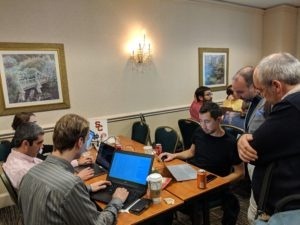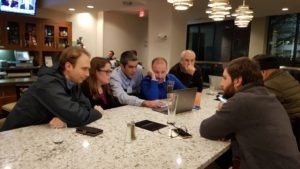COSINE: Cognitive Online Simulation of Information Network Environments
Funded by: DARPA SocialSim
The DARPA SocialSim program, which started in 2017, postulates that most of the world population is connected to the global information environment. Therefore, it is of paramount importance to understand how information spreads and being able to capture, at scale and in real time, the mechanisms that govern the diffusion of online information in an increasingly-interconnected world.
Our effort, spearheaded by the USC Information Sciences Institute and including Indiana University and the University of Notre Dame, was selected to tackle the challenges posed by DARPA SocialSim, with a project titled “COSINE: Cognitive Online Simulation of Information Network Environments” led by ISI researchers Emilio Ferrara (PI), Kristina Lerman (Co-PI), and James Blythe (Co-PI).
The goal of COSINE is to create the first-of-its-kind cognitive agent simulation framework for studying multi-scale dynamics of social phenomena in online information environments. Individual agent behaviors within COSINE will be based on first principles of human behavior, validated through laboratory experiments and empirical analysis. In addition, COSINE’s multi-resolution, scalable framework will enable time-resolved, massive simulations of dynamic, networked information environments. Online information diffusion is modeled using top-down statistical-physics models, mesoscopic-level compartmental and network-based models, and bottom-up agent-based dynamics. Agent models are based on neurocognitively-grounded principles of human behavior that incorporate bounded rationality and cognitive biases within models of attention. The system is calibrated on real-word data collected from a plethora of online platforms.
COSINE is a rich virtual laboratory for studying dynamics of online social phenomena at different temporal resolutions and at multiple scales, from individual to community to global collective behavior. COSINE directly incorporates multiplex networks into interactions between agents, thereby enabling the study of the impact of network structure and multiple communication modalities on emerging social phenomena, as well as how the position of individuals within the network affects their behavior. In addition, COSINE elucidates how the system responds to endogenous (shifts of attention) and exogenous shocks (e.g., crises, emergencies), and provides for a greater understanding of how the structure of social networks evolves in response to internal and external shocks.
COSINE is bringing a wealth of innovations to agent-based simulations and to the computational social sciences at large. Qualitatively, COSINE lays out first principles to characterize simulation-driven social sciences, provide unprecedented descriptive richness in the modeling of social dynamics, and foster the development of causal inference methods. Quantitatively, it allows for planetary-scale simulations of online information environments.
The USC Information Sciences Institute was awarded approximately $5 million and has been topping the first two DARPA SocialSim Challenges that aimed at simulating the spread of information on GitHub, Twitter, and Reddit. Furthermore, the output of this project has already appeared on journals the likes of the Proceedings of the National Academy of Sciences, Communications of the ACM, and many top conferences in ACM, IEEE, and AAAI.
DARPA Challenges
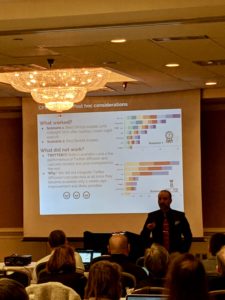
Our team winning Challenge 2 and on the podium on Challenge 1!
Team
 |
|||
| Emilio Ferrara Principal Investigator |
|||
 |
 |
 |
 |
| Homa Hosseinmardi Postdoc |
Goran Muric Postdoc |
Anna Sapienza Postdoc |
Gao Zhenxiang Postdoc |
 |
 |
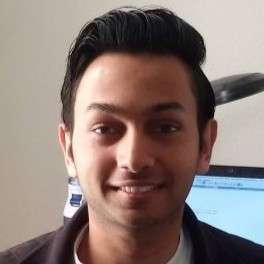 |
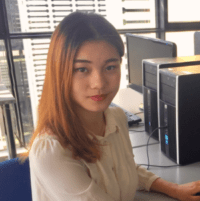 |
| Adam Badawy PhD |
Ashok Deb PhD |
Palash Goyal PhD |
Di (Diana) Huang PhD |
 |
 |
 |
 |
| Hsien-Te Kao PhD |
Akira Matsui PhD |
Shen Yan PhD |
Yilei Zeng PhD |
Publications (Journals)
- Yang, K. C., Varol, O., Davis, C. A., Ferrara, E., Flammini, A., & Menczer, F. (2019). Arming the public with artificial intelligence to counter social bots. Human Behavior and Emerging Technologies, 1(1), 48-61. Article Link
- Nikolov, D., Lalmas, M., Flammini, A., & Menczer, F. (2019). Quantifying biases in online information exposure. Journal of the Association for Information Science and Technology, 70(3), 218-229. Article Link
- Kudugunta, S., & Ferrara, E. (2018). Deep neural networks for bot detection. Information Sciences, 467, 312-322. Article Link
- Goyal, P., Hosseinmardi, H., Ferrara, E., & Galstyan, A. (2018). Capturing edge attributes via network embedding. IEEE Transactions on Computational Social Systems, 5(4), 907-917. Article Link
- Shao, C., Hui, P. M., Wang, L., Jiang, X., Flammini, A., Menczer, F., & Ciampaglia, G. L. (2018). Anatomy of an online misinformation network. PloS one, 13(4), e0196087. Article Link
- Ciampaglia, G. L., Nematzadeh, A., Menczer, F., & Flammini, A. (2018). How algorithmic popularity bias hinders or promotes quality. Scientific reports, 8(1), 15951. Article Link
- Shao, C., Ciampaglia, G. L., Varol, O., Yang, K. C., Flammini, A., & Menczer, F. (2018). The spread of low-credibility content by social bots. Nature communications, 9(1), 4787. Article Link
- Moriano, P., Finke, J., & Ahn, Y. Y. (2019). Community-Based Event Detection in Temporal Networks. Scientific reports, 9(1), 4358. Article Link
